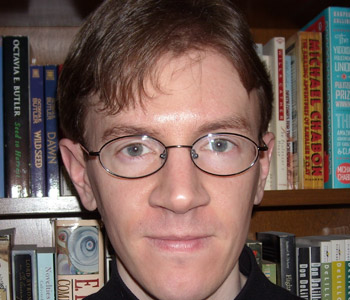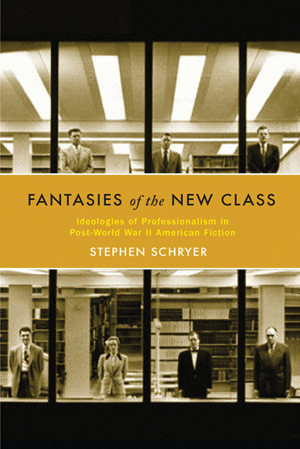
In the decades after World War II, the United States experienced an unprecedented boom in higher education. This boom altered the demographics of American society, creating a growing, educated middle class that was essential to the nation’s knowledge-based economy. In Fantasies of the New Class, I explore the impact of this demographic shift on postwar U.S. fiction and criticism.
Faced with an expanded audience who were, at least potentially, consumers of literary culture, writers envisaged themselves as educators with a special mission. They believed that they could fashion an aesthetically-attuned professional class who would transform American capitalism from within.
Reading Don DeLillo, Ralph Ellison, Mary McCarthy, Saul Bellow, Marge Piercy, Ursula K. LeGuin, Lionel Trilling, and John Crowe Ransom, among others, I argue that this exalted belief in literature’s influence was a constitutive illusion of postwar literary culture. This belief led writers to embrace a transformed conception of literary representation. They conceived of social reality as a tissue of ideas produced by competing knowledge elites, and they reshaped the American novel accordingly.
More broadly, American writers’ belief in the power of literary education resonated with models of intellectual agency shared by scholars from a variety of disciplines. Between the 1940s and 1970s, sociologists like Talcott Parsons, Gunnar Myrdal, C. Wright Mills, Daniel Bell, Alvin Gouldner, Irving Kristol, and others, believed that the professional or new class was in the process of displacing the capital-owning bourgeoisie. Shaped by the anti-materialistic culture of the university, the new class would usher in a more humane capitalism, a prospect that these writers viewed with either cautious optimism or chagrin.
My book highlights both the promise and flaws inherent in this exaggerated belief in the efficacy of new class cultural politics.
“This exalted belief in literature’s influence was a constitutive illusion of postwar literary culture … writers conceived of social reality as a tissue of ideas produced by competing knowledge elites, and they reshaped the American novel accordingly.”
However, one of the reasons for the American welfare state’s anemia is the evolution of the new class after World War II. In the early twentieth century, during the Progressive and New Deal eras, members of this class were at the forefront of social movements for the expansion of social welfare. As Steven Brint documents in In an Age of Experts, this class embraced an ideology called social trustee professionalism—one that envisaged professional expertise as a public good. Later in the century, the new class embraced a narrower ideology that Brint calls expert professionalism—a conception of expertise as a commodity for sale to the highest bidder.
How did this shift take place? In approaching this topic, I was guided by the assumption that literature—especially fiction—provides cultural historians with a complex understanding of the ideological divisions within the society that produces it.
Fiction is especially well-suited to addressing the ideology of professionalism, since writers, with varying degrees of comfort or discomfort, belong to the new class. In the post-World War II period, in particular, writers were becoming ever-more-closely associated with the university—the new class’s central institution.
My book begins in the 1940s by looking at two groups of literary critics who grappled with the new class’s impact on the production and consumption of literature: the New York Intellectuals and New Critics.
The latter group, in particular, played a crucial role in institutionalizing literature within the academy. These two groups cultivated the belief that literary education would instill an aesthetic appreciation of complexity within the new class, eventually pushing American capitalism away from the narrow materialism of the capital-owning bourgeoisie.
This was an idea that both groups ultimately derived from nineteenth-century culture critics like Matthew Arnold. Both the New York Intellectuals and New Critics embraced this cultural politics as an alternative to the more ambitious progressivism of the New Deal era. Literary intellectuals need not push for the traditional goals of social democracy; to do so would be to fall prey to the temptations of instrumental thinking.
From there, I move on to a variety of novelists from the 1950s to the 1980s who embraced some version of this cultural politics. I show how this politics shaped the work of writers whom we associate with all sides of the political spectrum—from the 1960s New Left to the neoconservative right.
Throughout, I argue that postwar writers’ emphasis on anti-instrumentalism was congruent with the expert professionalism that became dominant by the 1980s.
The book concludes with a reading of Don DeLillo’s White Noise, which I read as a reductio ad absurdum of new class politics. In that book, expert opinion has penetrated the fabric of American social life, to the extent that common sense activities like eating and drinking have become subject to professional scrutiny.
I hope that readers will begin with my introduction, which lays out the basic terms of my argument. However, casual readers might prefer to start with one of the chapters on the better-known novels that I work with: Ralph Ellison’s Invisible Man and Don DeLillo’s White Noise.
My reading of Invisible Man juxtaposes the novel with Gunnar Myrdal’s 1944 sociological study of U.S. race relations, An American Dilemma. Ellison imagined his fiction as being at odds with the sociology of race. He wrote a review of An American Dilemma in which he argued that Myrdal oversimplified black culture by reducing it to a reaction to white racism. This review became one of the key texts that many black intellectuals drew on to express their distrust of damage sociology like Daniel P. Moynihan’s The Negro Family—a government study that argued that centuries of race discrimination had damaged the black family.
I argue that the relationship between Ellison and Myrdal is much more complex than previous readers have imagined. Both writers embraced similar versions of new class cultural politics. Myrdal’s argument was that the American race problem arises from a conflict in the white psyche between an egalitarian American Creed embodied in founding documents like the Declaration of Independence and various local prejudices rooted in economic concerns. He believed that a project of national therapy was needed to resolve this conflict. The professionals were most suited to this; their education supposedly made them more attuned to the American Creed. Ellison, similarly, believed that racism was a series of cultural rituals founded on a conflict between ideals and prejudices, and he envisaged the novel as a force capable of healing the divided American psyche.
However, Ellison also complicates this cultural politics in the only novel that he published in his lifetime, Invisible Man. In this book, Ellison tells the story of a young, would-be black professional who tries to find a path through various American institutions: a segregated college modeled after Tuskegee Institute in Alabama, the white-collar business world of New York, and a political organization modeled after the Communist Party U.S.A. In all of these institutions, the invisible man encounters a cynical opportunism at odds with the idealism that Ellison believed was embodied in the best American novels. This opportunism is rooted in the economic uncertainty of professionals, especially black professionals—the fact that they are dependent on outside patronage.
For Ellison, in other words, what Myrdal refers to as the American Creed cannot be located in any specific class or institution, certainly not the new class of the 1940s and 1950s. In spite of his attraction to new class fantasy, in my book Ellison emerges as the figure who most clearly sees the economic underpinnings of American professionalism.
“For Ralph Ellison, what Gunnar Myrdal refers to as the American Creed cannot be located in any specific class or institution, certainly not the new class of the 1940s and 1950s. In spite of his attraction to new class fantasy, Ellison emerges as the figure who most clearly sees the economic underpinnings of American professionalism.”
I finished writing this book six months into the presidency of former law professor Barack Obama. For me, Obama represented a possible resurgence of the ideal of public-minded expertise—especially after the right-wing populism of George W. Bush. For the first time since Bush’s election, it seemed like a majority of Americans were growing to distrust the notion that gut instinct or patriotic feeling was enough to guide foreign and domestic policy decisions.
The subsequent rise of the Tea Party movement highlights many Americans’ ongoing suspicion of the welfare state and of anything but the most narrow interpretation of professionals’ social function.
In the face of this suspicion, my hope is that Fantasies of the New Class will help readers—especially readers in the academic humanities—get a clearer sense of the possibilities and limitations of cultural politics as traditionally practiced by literary intellectuals.
For too long, writers and literary critics have cultivated an inflated view of themselves as offering an anti-instrumental antidote to the rationalism of U.S. society, a position that has often led them to embrace an anti-statist politics. My sense is that this is a dead end for liberal and left-wing politics. Social democracy in the United States—which impacts the ongoing survival of all first-world welfare states—instead depends on the existence of a pragmatic, socially-conscious professional class.


Stephen Schryer is an assistant professor of English at the University of New Brunswick. He received his Ph.D. from the University of California, Irvine. In addition to Fantasies of the New Class, featured in his Rorotoko interview, Stephen Schryer has published in PMLA, Modern Fiction Studies, and Arizona Quarterly. He is working on a new book on post-World War II poverty discourse and American literature.